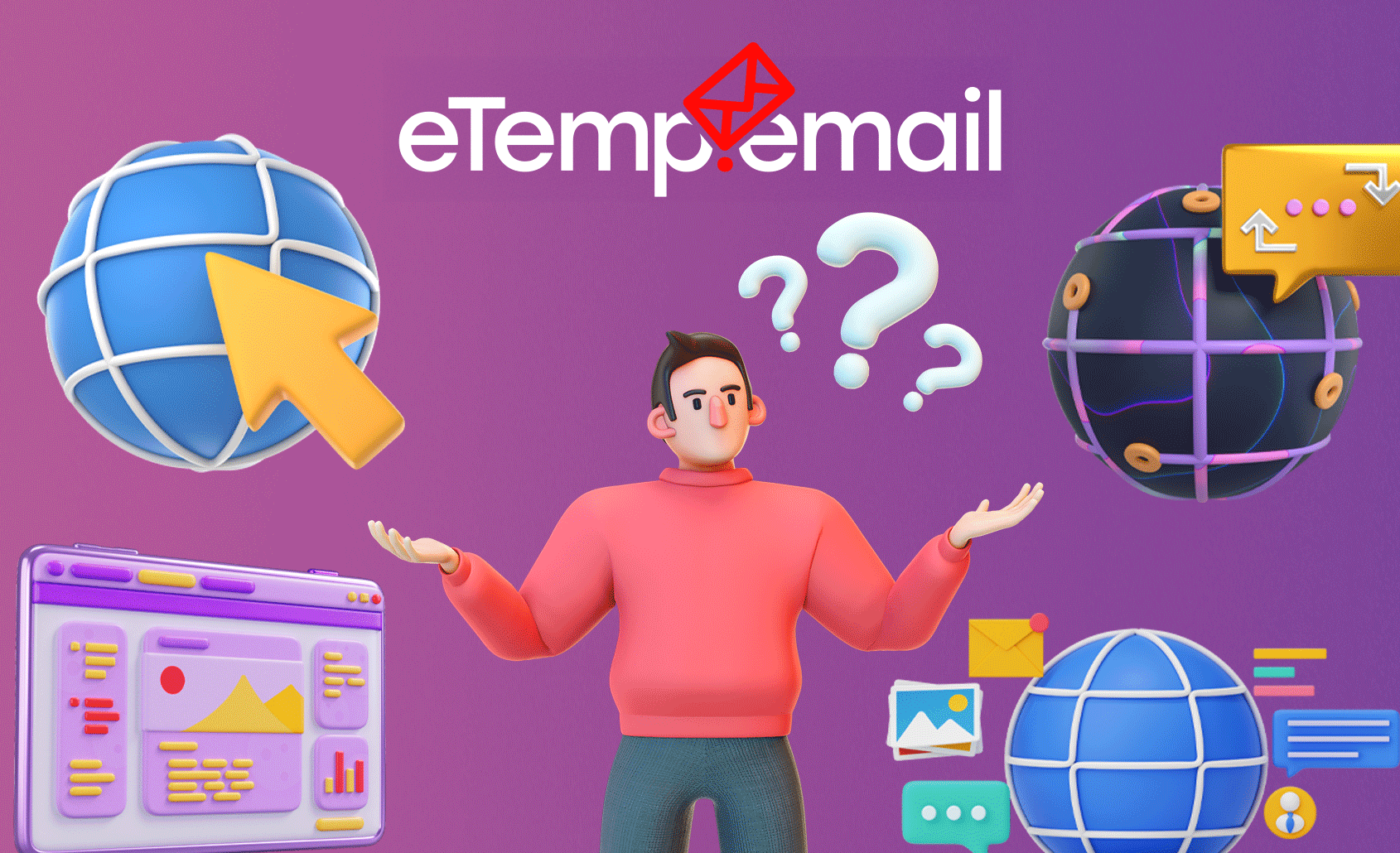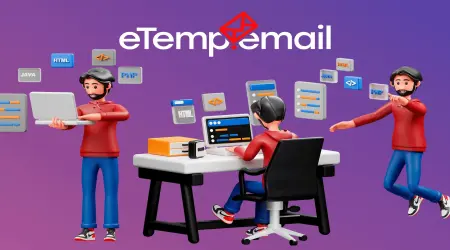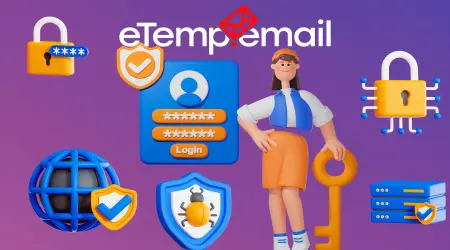

Web3 and Decentralization: Why the Internet No Longer Belongs to Corporations
In 2025, Web3 stands as a transformative force for the internet, fundamentally shifting control back to users over their data and digital assets. This paradigm, built upon blockchain-based decentralization, aims to break the entrenched monopolies of large corporations, offering a revolutionary new model for how the internet operates.
But what exactly is Web3? How is it profoundly reshaping the digital economy and our online interactions? And, crucially, why does data protection remain paramount even in this seemingly more user-centric and transparent digital world? This article will break down the core principles of Web3, explore its far-reaching impact on society, and explain how eTemp.email helps safeguard your privacy and security on the decentralized internet.
What Is Web3? The Next Generation of the Internet
Web3 represents the next evolutionary stage of the internet, fundamentally built upon decentralized technologies such as blockchain, smart contracts, and various forms of tokens (including NFTs and cryptocurrencies). Unlike its predecessor, Web2 (characterized by large, centralized platforms that control user data, such as search engines or social media giants), Web3 empowers users with true ownership of their data and digital assets.
Its key underlying principles include:
- Decentralization: Data and applications are stored and run on distributed networks of computers rather than on single corporate servers. This eliminates central points of control and failure, making the internet more robust and censorship-resistant.
- Transparency: Transactions and data interactions are recorded on public blockchains, which are immutable and available for verification by anyone. While transactions are transparent, users can maintain pseudonymity.
- User Control and Ownership: Through the use of secure digital wallets, users directly manage their data, digital identities, and assets. This means users decide how their information is used and monetize their own content, rather than intermediaries.
How Is Web3 Changing the Digital Economy? New Paradigms of Value
Web3 is fostering entirely new opportunities for individuals, creators, and businesses, challenging traditional economic models:
- True Ownership of Digital Assets: With NFTs (Non-Fungible Tokens) and various other tokens, users can now truly own unique digital objects, ranging from digital art and music to virtual real estate within metaverse environments. This verifiable digital ownership creates scarcity and value, enabling creators to directly monetize their work and users to possess genuine digital property. The market for unique digital collectibles, for instance, has seen explosive growth, reaching significant valuations.
- Decentralized Finance (DeFi): Banking Without Banks: DeFi platforms leverage blockchain and smart contracts to offer financial services—such as lending, borrowing, and trading—without
the need for traditional banks or intermediaries. These platforms allow direct exchange of cryptocurrencies, often resulting in reduced fees, increased speed, and greater accessibility to financial services for a global audience, especially those underserved by traditional banking systems. - Empowering Creators and Users in Social Media and Content: Web3 social media platforms and content networks aim to return control and revenue to creators and users. By eliminating dependence on the algorithms and monetization policies of major centralized social networks, authors can directly own their content, choose how it is distributed, and earn direct compensation from their audience, fostering more equitable digital economies for content creators.
Risks and Challenges of Web3: Navigating the New Frontier
Despite its transformative benefits, Web3 is not without its complexities and inherent cybersecurity threats:
- Phishing and Sophisticated Fraud: The decentralized nature and reliance on digital wallets make Web3 an attractive target for cybercriminals. Hackers create highly convincing fake Web3 platforms, deceptive smart contracts, or fraudulent NFT marketplaces designed to trick users into revealing their private keys or signing malicious transactions, leading to the theft of valuable crypto assets.
- Data Leakage and Pseudonymity vs. Anonymity: While Web3 promotes pseudonymity (transactions are public but linked to a wallet address, not directly to a real identity), signing up for certain decentralized services or engaging with platforms that require KYC (Know Your Customer) verification can still reveal personal information. This data, if mishandled by the platform, remains vulnerable to leaks, undermining the promise of privacy.
- Complexity and User Experience: Cryptocurrencies, smart contracts, and decentralized application (dApp) interfaces can be daunting and difficult for beginners to understand and navigate. The learning curve is steep, and user errors (like sending funds to the wrong address or approving malicious contracts) can lead to irreversible financial losses.
- Security of Digital Wallets: The responsibility for securing digital assets largely falls on the user. If a digital wallet's private keys are lost, stolen, or compromised, recovery can be impossible, leading to permanent loss of funds or NFTs.
To safely interact with Web3 and mitigate these risks, it is crucial to exercise extreme caution, especially when registering for new platforms. Using
The Future of Web3 by 2030: The Internet's New Backbone
By 2030, Web3 is projected to become a foundational component of the digital economy, deeply integrated into our daily online lives. Experts predict:
- Mass Adoption: More than 50% of internet users are expected to regularly interact with or utilize Web3 platforms and applications, making decentralized experiences commonplace.
- Seamless Integration with the Meta-Universe: Web3 technologies will serve as the essential economic and ownership layer for immersive virtual worlds. Users will truly own their avatars, virtual land, digital fashion, and other assets, fostering robust, user-governed metaverse economies.
- Quantum-Resilient Blockchains: As
quantum computers - Improved Scalability and Accessibility: Ongoing innovations in blockchain technology are addressing current limitations in speed and transaction costs, making Web3 more efficient and accessible for widespread adoption.
How Does eTemp.email Help in the Web3 Era? Your Privacy Gateway
Engaging with Web3 platforms—whether it's exploring DeFi services, navigating NFT marketplaces, or joining decentralized social networks—often requires initial registration and introduces new vectors for digital risk. eTemp.email serves as an indispensable tool for safeguarding your privacy and security in this evolving environment:
- Create Temporary Email Addresses in Seconds: Rapidly generate unique, disposable email addresses for each new Web3 service you want to explore, without exposing your primary, long-term email.
- Avoid Phishing and Spam: Shield your main inbox from unwanted marketing communications, newsletters, or malicious phishing attempts that might originate from less secure or experimental decentralized platforms.
- Maintain Anonymity When Testing Decentralized Services: Explore and experiment with new Web3 applications and beta environments without linking your personal identity or primary email to potentially unknown data collection practices.
- Isolate Risk: If a Web3 platform experiences a data breach or falls victim to a scam, only your temporary email is compromised, keeping your primary digital identity secure and preventing unwanted information from reaching your main inbox.
Conclusion
Web3 in 2025 is unequivocally bringing control of the internet back to its users, challenging the long-standing monopolies of corporations. From the verifiable ownership enabled by NFTs to the disintermediated financial services of DeFi, decentralization opens up a wealth of new opportunities. However, this exciting frontier demands increased vigilance and robust cybersecurity practices.
By leveraging trusted tools like eTemp.email, you can safely explore Web3, experiment with decentralized applications, and contribute to the future of the internet without risking your personal data. Try




